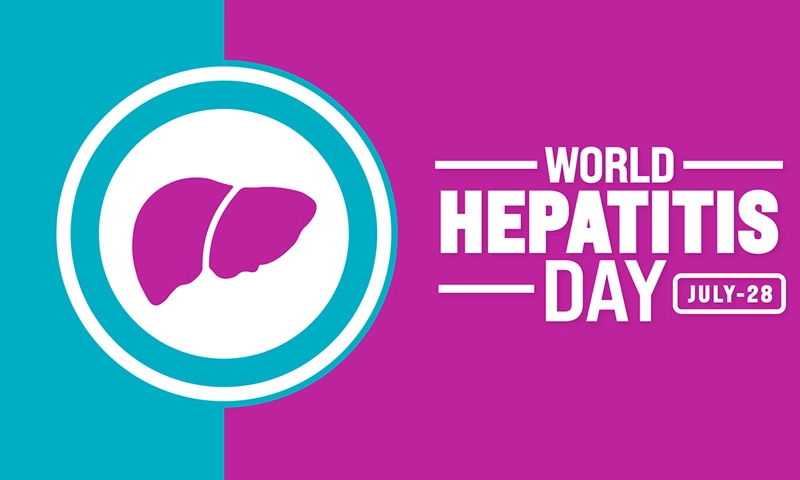- Web Desk
- 17 Minutes ago

WHO calls for urgent action to combat hepatitis in Pakistan
-

- Web Desk
- Today

ISLAMABAD: The World Health Organization (WHO) has called for urgent action to combat hepatitis in Pakistan, where 10 million people are infected with hepatitis C and 3.8 million with hepatitis B.
On the World Hepatitis Day, the WHO said that the disease continues to silently cause liver damage and cancer in Pakistan, which bears the heaviest burden of hepatitis C globally – with 10 million of the 60 million estimated cases worldwide – and has 3.8 million people living with hepatitis B.
“Only 25-30 per cent of the affected people know it, which prevents them from receiving life-saving treatment,” the WHO said.
Under the international theme “Let’s break it down”, the WHO has urged policymakers and health authorities worldwide to simplify, scale up and integrate hepatitis services into national health systems – including vaccination, safe injection practices, harm reduction, and especially testing and treatment. The goal: ending hepatitis as a public health problem by 2030.
The WHO reiterated its full support for Pakistan in its efforts to fight the disease, and particularly the Prime Minister’s National Programme for the Elimination of Hepatitis C Infection. This programme aims to test 50 per cent of the eligible population (82.5 million people aged 12 years and above) and treat 5 million people by 2027.
Also read: PM Shehbaz urges sustained efforts to eliminate polio, hepatitis from Pakistan
“WHO will continue to fully support Pakistan in its journey to combat hepatitis and reinforce prevention, detection, and treatment, ensuring that we protect the most vulnerable populations to leave no one behind,” said WHO Representative in Pakistan Dr Dapeng Luo.
Hepatitis B and C are preventable and treatable, but if left untreated they can lead to medical complications – including liver cancer – and death.
In Pakistan, the most common modes of transmission are unsafe procedures and materials used during blood transfusions – due to unregulated private blood banks and a lack of universal screening, injections with re-used and non-sterile syringes and needles, surgical procedures, dental care, body piercing and tattooing, and shaving – including at barber shops.
Globally, chronic viral hepatitis causes 1.3 million deaths every year, mostly from liver cancer and cirrhosis. That equals 3,500 deaths every day.
“The WHO will continue to stand side by side with Pakistan to provide science-based guidance and support to strengthen prevention – including the vaccination of newborns against hepatitis B within 24 hours, diagnosis and treatment for all, no matter where they live or who they are.”
President for joint efforts to combat hepatitis
Meanwhile, President Asif Ali Zardari called upon all stakeholders, including government institutions, healthcare professionals, private sector partners, media and civil society to join hands in a unified response to combat the challenge of hepatitis, besides underscoring the need of raising public awareness.
In a message on the ‘World Hepatitis Day’ being observed on July 28, the president said the day is observed to raise awareness of the dangers of hepatitis and to promote collective action to prevent and control this growing public health threat.
He said that addressing hepatitis required an integrated and coordinated national response.
“We must implement comprehensive strategies that combine mass awareness campaigns, effective vaccination drives, timely screening and access to treatment. It is imperative to extend these services to all segments of society, especially in underserved and rural areas.
Govt making concerted effort to contain hepatitis: PM
Meanwhile, Prime Minister Shehbaz Sharif said that the government of Pakistan was making concerted efforts to contain the hepatitis epidemic and has launched the Prime Minister’s National Programme for the Elimination of Hepatitis C, which aimed to screen over 165 million people by 2030 and provide free treatment to all positive cases.
In a message on the World Hepatitis Day, he said, “This is a national movement that is a testament to our collective commitment to saving lives and securing the future. To make this vision a reality, we call on different segments of society to contribute to the efforts to end this scourge.”
He said, “On this World Hepatitis Day, we join the international community in reaffirming our commitment to eliminate hepatitis and protect the health of our people.”
“Pakistan is among the countries that are widely affected by the global hepatitis C epidemic. Viral hepatitis is one of the global public health challenges,” he remarked.
He said, “A large number of people infected with hepatitis B or C remain undiagnosed and untreated. While hepatitis poses a threat to all segments of society, certain segments of population remain at higher risk, including those receiving unsafe blood transfusions, patients undergoing unregulated medical procedures, newborns of infected mothers, healthcare workers, while the user of contaminated equipment or reused syringes, inadequate infection control, especially in rural and under-resourced areas, increase the risk.”
The prime minister said, “Raising awareness about hepatitis is essential not only to break the stigma surrounding the disease, but also to prevent new infections and ensure timely treatment for those affected. We must encourage people to get tested, seek medical advice, and not put off treatment due to fear or stigma.
Our healthcare professionals, researchers, and frontline workers are working tirelessly, and they need the support of the entire community.”
“Today, we reaffirm our collective responsibility to build a healthy, safe, and hepatitis-free Pakistan,” he concluded.





